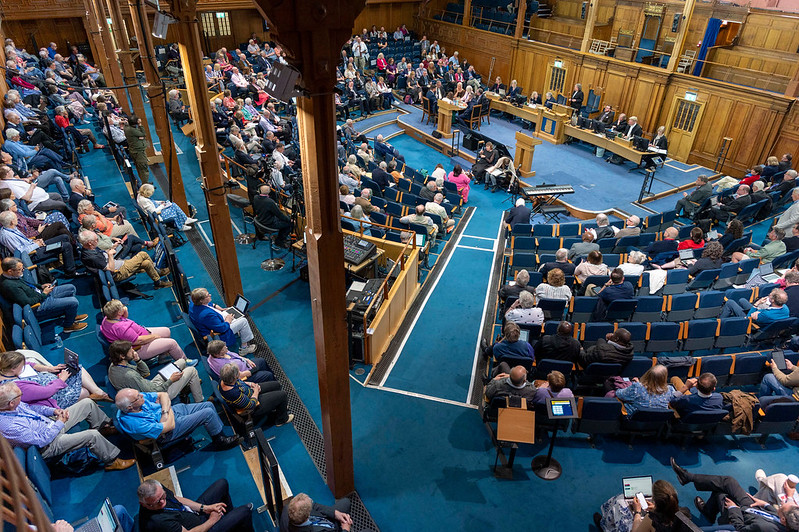Published on 21 May 2025
4 minutes read
Social care in Scotland is under unprecedented pressure, but debates about funding overlook its core purpose: delivering compassionate care to those in need.

The General Assembly has expressed concern about the state of social care in Scotland.
That was the message of the convener of the Church of Scotland’s Social Care Council and chair of the board of CrossReach, the Church of Scotland’s social care arm, Dr Mike Cantlay, to the General Assembly this morning.
“Everyone realises that across Scotland, social care is under unprecedented pressure. National and local government are closing provision or curtailing funding, whilst every day, providers of services are going out of business and leaving the sector,” he said.
“The debate has moved from governance in the form of a National Care Service to funding. But for me, the debate is in danger of missing the point. Social care is neither about structure nor funding, important as these are.
“Fundamentally, social care is about love: the ability to offer loving, compassionate care to those in acute need. And we forget that core purpose at our peril.”
That core purpose is reflected in the title of CrossReach’s recently launched five-year strategic plan: “Love from CrossReach”.
Last year CrossReach delivered £62 million of loving social care across Scotland, providing perinatal counselling, caring for the severely disabled, counselling families in crisis, supporting those in recovery from addiction, providing accommodation for the homeless, homes for people with dementia, and more.

CrossReach board chair Dr Mike Cantlay.
“Providing loving care is central to all we do,” Dr Cantlay said.
“Quite simply, we take our lead from the Gospel. We are called to love extravagantly, and care, deeply. And so, we do.”
Safe, supported and happy
CrossReach’s annual survey of service users found that the top three words used to describe how people felt about CrossReach were: safe, supported and happy.
The survey also found that 95% of health and social care clients felt that if they made a complaint, it was acted on, with 94% saying staff treated them with respect and were kind and caring, and 92% feeling safe and protected from abuse, neglect or avoidable harm.
However, Dr Cantlay acknowledged that in wider society things feel harder for many people than they have ever done, with drugs deaths continuing to be unacceptably high, a housing crisis, a mental health epidemic and over a million people living in poverty.
“If we are to continue to offer love into places of hardship and hurt, and help turn that around, we need a strategy; a plan inspired by love, but grounded in the reality of austerity and financial insecurity,” Dr Cantlay said.
CrossReach also cared about its 1,800 employees and had been able continue to offer the Living Wage as its base salary point and had improved both recruitment and retention, Dr Cantlay continued.
The organisation also cared about the current underfunding of social care, to which CrossReach was not immune with a number of funding cuts over the past few months, resulting in people not getting the full support that they need and CrossReach having to make “some extremely difficult decisions” this year.
“To make the right decisions at the right time and for the right reasons, we need a strategy,” Dr Cantlay continued.
“A plan inspired by love, but grounded in the reality of a broken system and uncertain funding.
“Please get excited with us, be part of the plan, and help us to make a difference in a society which still needs its Church to speak up and to act for the most marginalised and disadvantaged.”
The General Assembly approved the report, but also pledged to encourage congregations and Presbyteries to engage with CrossReach on its new strategy and support the recruitment of CrossReach staff, as well as endorse interfaith and ecumenical efforts to raise awareness of the need for Fair Work in social care in Scotland and raise this at the highest level with the Scottish Government.

Commissioners listen to the debate at the Assembly Hall.
The Assembly also agreed to express its deep concern about the worsening state of social care in Scotland and the lack of progress on necessary long-term reform, and to make available resources which will enable Presbyteries and congregations to raise the issue as a matter of critical concern in the run up to the 2026 Scottish elections.
A further amendment proposed by Marjorie Clark of Perth Presbytery was approved, acknowledging the excellent work carried out by the CrossReach run family visitor centres at HMP Perth and HMP and YOI Polmont and the Assembly’s concern for their future following cuts in Scottish Government funding.
Mrs Clark said: “We in Perth Presbytery were dismayed and very disappointed to learn that CrossReach had been unsuccessful in obtaining continued funding for the two CrossReach visitor centres in our area.
“We are, of course, very sorry that the link with CrossReach has been broken, though of course we will continue to support the work of the centres in any way we can and the important and vital role they have in supporting families who are visiting loved ones, where they are listened to, valued and given a safe space, advice and so much more.”